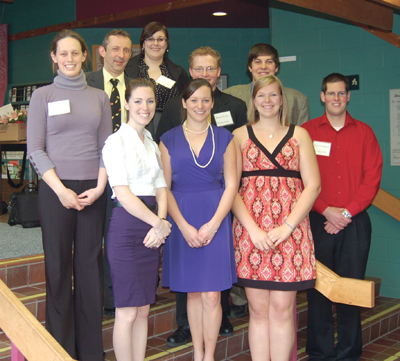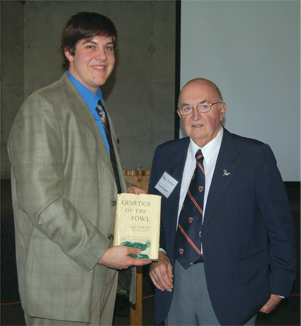
Closing the Gap
By Dr. Peter Hunton
Features New Technology ProductionThe student poultry club at the University of Guelph aims to challenge students
With the disappearance of production-oriented courses at the University
of Guelph over the year, a gap has developed between qualified
personnel and industry need.
With the disappearance of production-oriented courses at the University of Guelph over the year, a gap has developed between qualified personnel and industry need.
 |
|
| Poultry Enthusiasts Members of the University of Guelph Poultry Club. Top: Dr. Gregoy Bedecarrats, Chanelle Taylor Middle: Kaitlyn Link, Bruce Avison, Daniel Ingratta, Ryan Greidanus. Bottom: Katherine Murray, Jessica Feagan, Mieke Spruit. Missing from photo: Aric Bos. Advertisement
|
To start closing this gap, a student Poultry Club was formed at the University of Guelph in 2009. Currently, the club has nine members and they are supervised by Dr. Gregoy Bédécarrats, a professor in the department of Animal and Poultry Science.
To join, members should have a genuine interest in poultry. Another stimuli for the formation of the club, according Bédécarrats, was the need to find people to assist with the maintenance of four heritage lines of chickens donated to the University several years ago by renowned poultry breeder Dr. Donald McQueen Shaver. Club members have become involved with record keeping, selection of birds for breeding, artificial insemination and incubation. In the course of this work, students have become familiar with the various characteristics that contribute to commercial success, including both performance traits and egg quality.
In addition to these volunteer activities, which represent excellent hands-on experience with poultry, students may register for two credit courses called Special Studies in Agricultural Science (levels one and two). In these courses, students must identify a specific challenge facing the poultry industry. They then research and analyze the problem and discuss potential solutions. Students in the current club membership have brainstormed such topics as improved housing, alternatives to corn-based diets, and the use of alternative materials in dust baths. They have also considered breeding strategies for new strains adapted to a non-cage environment. Each student must then produce a final report and a class presentation, where the report is discussed by the group, along with faculty members.
Based upon the combination of practical and theoretical aspects of their work, a final grade is assessed.
Some of the activities are similar to those available at the University of Alberta, in a course on Poultry Production initiated by Prof. Frank Robinson several years ago. This has been extremely successful, with many graduates now established in various positions in the poultry industry across the country. Imitation is the sincerest form of flattery, and both institutions should be applauded for providing students with great opportunities for hands-on learning, something that is not always considered in the contemporary teaching of animal and poultry science.
The newly formed Poultry Club held its first gala event on April 17, a luncheon to honour Dr. Shaver for his contributions to agriculture in Ontario, Canada and the world.
 Continuing the Legacy Continuing the Legacy Two of the Guelph students have been compiling a video biography of Dr. Donald McQueen Shaver and his contributions to agriculture over the past 70 years. A short excerpt from the video, which will eventually run for over one hour, was shown to the participants at the gala. Following the video, Dr. Shaver urged the club members to participate in the democratic process, even if this means supporting ethical government policy “legislating for our grandchildren.” He pointed out that in the recent federal budget, funding for agriculture is anticipated to fall by 41 per cent over the next three years. This will impact research and university funding. Following Dr. Shaver’s address, Dr. Peter Hunton reviewed a few of his experiences in the poultry industry, and presented members of the Poultry Club with a signed copy of Genetics of the Fowl by Frederick B. Hutt, the famous Canadian-born geneticist who worked for many years at Cornell University. (Above photo: Dr. Peter Hunton (right) presented the poultry club with a signed copy of Genetics of the Fowl.) |
Print this page